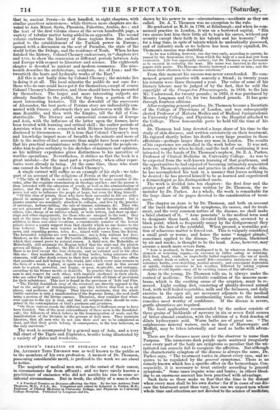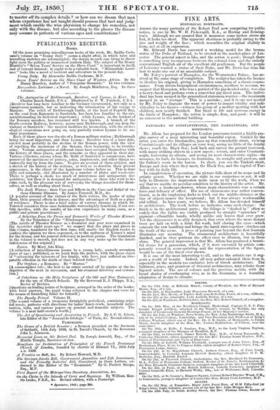THOMSON'S TREATISE ON DISEASES OF THE SKIN. * Da. ANTHONY TODD
THOMSON was as well known to the public as to the members of his own profession. A memoir of Dr. Thomson, possessing considerable merit, is prefixed to the work we are about to notice.
The majority of medical men are, at the outset of their career, in circumstances far from affluent; and we have rarely known a praetitioner of eminence who did not ascribe his rise to some ac- cidental circumstance. But in truth, the ability of a man is often
• A Practical Treatise on Diseases affecting the Skin. By the late Anthony Todd Thomson, M.D., F.L.S., itt.C. Completed and edited by Edmund A. Parkes, M.D.. Professor of Clinical Medicine in University College, and Physician to University College Hospital. Published by Longman and Co.
shown by his power to use—circumstances—accidents as they are called. Dr. A. T. Thomson was no exception to the rule. He graduated as M.D. in 1799, at Edinburgh ; and when he com- menced practice in London, it was on a borrowed capital. " His two sisters lent him their little all to begin his career, without any security except their faith in his talents and his honesty." But for a long time, in spite of talents which he undoubtedly possessed, and of industry such as we believe has been rarely equalled, Dr. Thomson's success was doubtfuL
" As he was walking, however' one day very early according to custom, he passed by the Serpentine river, from which the body y of a man had just been extricated. Life was apparently extinct; but Dr. Thomson AMU so fortunate as to succeed in restoring the man. His name was inserted in the news- papers with praise. The Humane Society bestowed a medal on him ; and the incident drew attention to his obscure exertions."
From this moment his success was never overclouded. He com- menced general practice with scarcely a friend ; in twenty years his returns were three thousand a year. The value of sonic of his literary labours may be judged of by the feet, that he sold the copyright of the Conspectus Pharmacopceia, in 1810, to the late Mr. Underwood, for twenty pounds ; in 1833, it was purchased by Messrs. Longman and Co. for two hundred pounds. It has gone through fourteen editions.
After resigning general practice, Dr. Thomson became a licentiate of the College of Physicians of London, and was subsequently elected Professor of Materia Medica and of Medical Jurisprudence in University College, and Physician to the Hospital attached to the College. These honourable posts he held fill the time of his death.
Dr. Thomson had long devoted a large share of his time to the • study of skin diseases and written extensively on their treatment. He enjoyed shortly before his death a very large practice in those affections—perhaps larger than any man in London. The results of his experience are embodied in the work before us. It was not, however, complete when he died; and the task of continuing it was intrusted to the hands of Dr. Thomson's nephew, Dr. E. A. Parkes, Professor of Clinical Medicine in University College. As was to be expected from the well-known learning of that gentleman, and the opportunities he had enjoyed of becoming intimately acquainted with 1)r. Thomson's opinions and practice in affections of the skin, he has accomplished his task in a manner that leaves nothing to be desired : he has proved himself to be as learned and experienced a dermatologist as his distinguished uncle.
The work is divided into ten chapters : the first four and the greater part of the fifth were written by Dr. Thomson the re- mainder by Dr. Parkes. As a whole, the work is remarkable for the large share of its pages devoted to the consideration of treat- ment.
The chapter on Acne is by Dr. Thomson, and both on account of the lucid description of its symptoms, its causes, and its treat- ment, and the very common nature of the disease, we shall make a brief abstract of it. "Acne punotata " is the medical term used to designate those hard, red, elevated little spots, crowned by a black point, which so frequently annoy by the disfigurement they cause to the face of the youthful. When pressed, a wormlike pop- -don of sebaceous matter is forced out. This is vulgarly considered a small grub or worm; and hence the name "maggot pimple," sometimes applied to the disease. The outer portion, blackened. by air and smoke, is thought to be the head. Acne, however, may assume a much more severe form.
"Acne is produced, in those predisposed to it, by whatever deraqes the stomach or secreting organs,—as excesses in either eating or drinking. Rich food, hard, crude, or imperfectly boiled vegetables—the use of much pork, either fresh or salted, or much fish—excessive indulgence in sleep, sedentary habits, over-watching, mental anxiety, and consequent depression of spirits, violent exercise in hot weather, followed by taking copious draughts of cold liquids—may all be exciting causes of this affection."
Acne in the young, Dr. Thomson tells us, is always under the control of medicine. The irritable condition of the mucous mem- brane, which is the exciting cause of the eruption, must be re- moved. Light cooling diet, consisting of plainly-dressed animal food, with well-boiled vegetables, milk and the farinacea, and daily exercise in the open air, are necessary adjuncts to the medical. treatment. Antacids and unstimulating tonics are the internal remedies most worthy of confidence. If the disease is severe, gentle alteratives are required. The local application recommended by. the author consists of three grains of biehloride of mercury in six or seven fluid ounces of bitter almond emulsion, with the addition of a fluid drachm of dilute hydrocyanic acid. Warm baths are of groat use. "The snlphureous mineral waters, such as those of Harrowgate and Moffatt, may be taken internally and used as baths with advan- tage."
'fhero are few diseases more easy for the observer to name than Purpura. The numerous dark purple spots scattered irregularly over every part of the body are symptoms so peculiar that the un- initiated can scarcely fail to recognize the affection. But although the characteristic symptom of the disease is always the same, Dr. Parkes says, "The treatment varies in almost every ease, and re- quires to be regulated by the general symptoms. There is no remedy known which has a specific effect on the htemorrhage. Con- sequently, it is necessary to treat entirely according to general symptoms." Some eases require wine and tonics ; in others bleed- ing to an enormous amount has been practised with advantage.
Such facts as these make us fear that the time is far distant when every man shall be his own doctor : for if in cases of one dis- ease the treatment must thus vary, how can we expect men whose whole time and attention are not devoted to the science of medicine,
to -master all its complex details? or how can we dream that men whom experience has not taught should possess that tact and judg- ment which enable the wise physician to change his remedies, not only with the disease but also according to the phases the disease may assume in patients of various ages and constitutions?



























 Previous page
Previous page